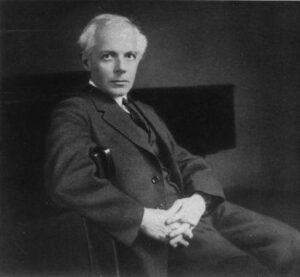Brahms, Bartok & Bernstein
Brahms
JOHANNES BRAHMS (1833-1897) wrote the delightful LIEBESLIEDER WALTZES, Op. 52, in 1896 while working in Vienna. This collection of charming and intimate love songs, originally written for vocal quartet and piano four-hands, captures Brahms’ mastery of both vocal and pianistic writing, evoking a sense of romance and nostalgia through its elegant waltz rhythms and heartfelt poetry. Each of the parts, piano and voices, can stand alone, but Brahms’ genius is in the way he bound them together.

As texts, Brahms chose poems from translations of Russian, Polish, and Magyar folk poetry. They express the gamut of human emotions on the subject of Eros, from flirtation to enticement, to strong passion, to domestic harmony, to endless bliss, to various forms of disappointment/frustration, to sweet directness, to sadness at rejection, with a nod to ebullient young love. You can hear the raging spring, see the little bird hopping around trying to find a home, view the cocky swain eying the iron bars on the pretty maiden’s front door, and so forth. We hope you can hear the joy and rapture of love in these waltzes.
Click on the button below to view the translations.
Bartok
Of all the 20 th Century composers, none was more integrally connected to folksong than the great Hungarian BELA BARTOK (1881-1945). He traveled through the countryside, seeking the roots of meters, rhythms, and modalities in the spontaneous songs and dances of the people, and collecting Hungarian, Transylvanian, Romanian and Slovakian folksongs. This fascination resulted in thousands of transcriptions gleaned from peasant musicians.

The FOUR SLOVAK FOLK SONGS were composed for mixed chorus and piano in 1917, the only choral work Bartók ever composed with piano accompaniment. The text of the first song consists of a dialogue between a mother and a daughter, the latter of whom is bitter at being sent away to another country to marry an evil man. The second is a hay-making song, the third is jaunty and dance-like, while the fourth contains drones that evoke the sound of peasant bagpipes. Listeners will hear Bartók’s affinity for scales and harmonies that predate the conventions of Western art music.
Bernstein
LEONARD BERNSTEIN (1918-1990) broke traditional boundaries in all of his endeavors. He was the first native-born American conductor to achieve worldwide fame. An excellent pianist, he often appeared as soloist, conducting the orchestra from the piano. Bernstein seems equally proficient as a symphonic and operatic composer as well as a composer of complex musical
works and of original and enormously popular stage productions. Today we offer a very small sampling of his works for voices.

I HATE MUSIC is the third song of Bernstein’s cycle I Hate Music!: A Cycle of Five Kid Songs. Apparently, when fed up with hearing Bernstein constantly coaching singers and playing piano, Bernstein’s flat mate often uttered the title phrase.
GLORIA TIBI is part of Mass: A Theatre Piece for Singers, Players and Dancers. Written in 1971 for the opening of Washington DC’s Kennedy Center, it interweaves rock music with a setting of the Catholic Mass.
In 1950, Bernstein wrote the incidental music for the play Peter Pan. He composed rather too much music and lyrics, and much of it had to be cut. DREAM WITH ME was one of the cuts.
Too bad!
The idea for West Side Story was born in 1948 when Jerome Robbins, the choreographer, came to Bernstein with a proposal for a serious musical that could perhaps become the “real moving American opera” of which Bernstein had dreamed. He chose Stephen Sondheim as his librettist. The musical finally reached the stage in 1957 and was released as a film in 1961. Together, Bernstein, Sondheim and Robbins succeeded in creating a significant social drama which abounds in memorable tunes, exciting dances and thrilling instrumental music. We share a medley and arrangement of these tunes tonight.
We conclude with MAKE OUR GARDEN GROW, an excerpt from Candide, an operetta based on Voltaire’s novella of 1759. Candide is in love with Cunégonde. Dr Pangloss, their tutor, teaches them that everything in this world is for the best and part of God’s universal plan. Candide is then subjected to a knockabout series of disasters to test this theory. The story presents a satirical denunciation of optimism as it reveals a world of folly, disappointment, and
cruelty. The final line of the script is “We must cultivate our garden,” meaning that we should do our best with what we have. Extremely difficult to produce, the show has gone through numerous revisions. At the time of his death in 1990, Bernstein had collaborated on seven versions of the work, ranging from 1956 to 1989. The brilliant score consists of nearly two hours of music and over thirty numbers. Bravo Bernstein!
